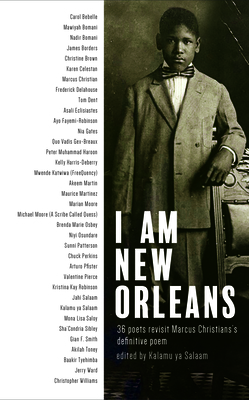Book Review: I Am New Orleans: 36 Poets Revisit Marcus Christian’s Definitive Poem
Edited by Kalamu ya Salaam
List Price: $16.95University of New Orleans Press (Sep 22, 2020)
Poetry, Paperback, 120 pages
More Info ▶
Book Reviewed by Robert Fleming
American poet, author, filmmaker, and teacher Kalamu ya Salaam, a leading citizen of New Orleans’s 9th Ward, has always been a booster for the Crescent City. With the current revitalization of the post-Katrina metropolis, he is promoting its past and present to those who have a long-standing fascination with its “saints and sinners.” Professor Kalamu ya Salaam’s latest tribute to the city elevates a prized literary ancestor, historian and folklorist Marcus Christian, whose signature poem, “I Am New Orleans.” Christian’s work was first published on the city’s 250th birthday in 1968.
This collection, which emphasizes the themes of Christian’s verse, features 36 poets with a steadfast loyalty and affection for the city that holds the popular Mardi Gras festival yearly. Some of the poets are quickly recognizable and others are beloved solely by the locals. Nevertheless, the line-up has been carefully selected by Salaam, including Tom Dent, Carol Bebelle, Nadir Lasana Bomani, Kelly Harris-DeBerry, Chuck Perkins, Jahi Salaam, Brenda Marie Osbey, Valentine Pierce, Baakir Tyehimba, Christopher Williams, and Jerry W. Ward Jr. This is the finest poetic ensemble currently available to sing the praises of their magical city.
Returning to the “saints and sinners” theme, Salaam touches on the high notes of the place where jazz was born in Congo Square. “You’ve heard the phrase “saints and sinner?” Well, we be both. We dance down wild streets decked out in white Communion Sunday clothes or saunter, leaning stylishly on a mahogany walking cane while sporting sky pieces, tignons, turbans, and assorted headgear. Greet our friends with a mutual kiss on both cheeks, cheer, and cool ourselves waving hand fans with King’s picture printed on them. Whether a high school marching band or some trumpet-led brass band, our pulsing music pushes us prancing and dancing on.”
The glittering poetic centerpiece of the collection sets the rock-steady tone by the city’s historian, Marcus Christian in “I Am New Orleans:”
I am New Orleans –
A perpetual Mardi Gras
of wild Indians, clowns, lords and ladies,
Bourbon Street Jezebels, Baby Dolls, and Fat Cats;
Peanut vendors, flower sellers, organ-grinders, chimney-
sweepers, and fortune-tellers,
And then, at the end, bone-rattling skeletons and flying ghosts.
Kelly Harris-DeBerry’s “Post-Katrina Blues” deals with the aftermath of the tragic superstorm that devastated the city:
ribbon cuttings
can almost make you
forget
black bodies shot on
danizger bridge
henry glover
burned
skull missing
a new city
a new year
making neighborhoods look
rebuilt
zoom in closer.
The rebel, Baskir Tyehimba plays on the titles of one of the most political films, “A Battle for Algiers:”
It’s a gang of guerillas poised for expressive thoughts
In what was once the training grounds for the architects
of Free Town
It’s a maroon camp of black cats who vow never to bow
To none other than themselves
And then, only with love and reverence
Even the gentrification of New Orleans does not go unnoticed as the 13-year-old local poet, Nia Gates focuses on the dilemma in “My Neighborhood Is Changing:”
I take pictures of my neighborhood now
so in the future I will remember
what it was
and I can see what it is
Poet-activist Tom Dent, whose courageous reputation was earned beside Dr. King in the civil rights battles, prays for the spiritual elders to intercede on behalf on the city’s citizens in “Return to English Turn:”
we look for deliverance
as the spirit of our ancestors
hovers above the place harvesting memory
may our gods watch over the long journey
may the god of music
bestow grace upon us
as we journey along the river
goes wrong again in the night
Like the veteran scribe Jerry Ward Jr. writes in his stirring afterword, he describes this anthology as “a post-Katrina metaphor and a signifying on and off the psychology and philosophical dimensions of poetic autobiography.” Every poem reveals an emotional memory or a political opinion. Kalamu ya Salaam’s anthology belongs alongside some of the iconic collections in its literary significance, including Black Fire, Giant Talk, Hoodoo Hollering Bebop Ghosts, and Conjure. Don’t miss it.


